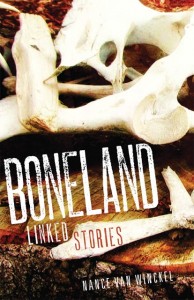Book Review
 Capture the flux of three generations across multiple states. Sketch it out in striking images. Weave it through with the tissues—tight and narrow here, loose and tenuous there—that make up a clan. Drag up a dusty bone, place its powder on our tongues, and call it Boneland.
Capture the flux of three generations across multiple states. Sketch it out in striking images. Weave it through with the tissues—tight and narrow here, loose and tenuous there—that make up a clan. Drag up a dusty bone, place its powder on our tongues, and call it Boneland.
From acclaimed poet and writer Nance Van Winckel comes this collection of linked short stories that first appeared in Colorado Review, the Massachusetts Review, Agni, and other publications. The stories chronicle the lives of the Lundstrum cousins—Lynette, Jessie, Robert, and Buster—descendants of a Montana ranch family. And like a stack of dusty family postcards found in a shoebox in the cellar, the stories overlap and splinter off, crossing boundaries of space and time, past and present. Together they compose an oblique and beautiful whole.
The main character, Lynette, is the backbone of the family in more ways than one. As a teen, she suffered from scoliosis so severe that it required the surgical implant of titanium rods. But it is from the perspective of an older Lynette coping with a botched Lasik surgery that we begin to fully understand the fortitude of this extended Montana clan. They approach adversity in a straight-forward and uncomplaining way, devoid of emotion. In “Funeral of the Virgin,” for example, Lynette explains how she learned about her late husband’s death years earlier:
The man in the suit said he was from the Burlington Northern Railway. Hadn’t he handed her a card? The policeman had definitely shown her his badge—just before he’d said something about an accident. The black pickup hadn’t been crossing at a regular crossing site, the railway man told her; it was an access road—for train equipment only. Might she know why he’d been out there? On that particular road? So far from the city?
Maybe he was taking a shortcut, she’d proposed to the two men. Maybe the load of computer tables he’d been hauling to the warehouse where he worked—maybe that heavy load had weighed his truck down and he’d gotten stuck on those tracks.
In Lynette’s search for an explanation, we begin to see the underlying truth. It has taken ten years for her to confront the question so evident to all in the room that night: Had her husband intended to die?
In contrast to Lynette’s quiet and responsible life is that of her cousin Jessie, whose wildness plays against Lynette’s placidity to give the Lundstrom family its depth and realism. From watching as her sister and mother are washed away by the sea in “The Ides,” to her understanding of dark, unspeakable things in “The Wild Boys,” Jessie becomes less and less moored to the family. She observes the feral attitudes of homeless boys and recognizes herself in them:
Deedee pointed them out: just around the jut of rocks where the white sand ended and the rough black stones met the water. Jessie understood that the boys no longer carried within them whatever it was that kept her and the other girls swimming, as instructed, under the lifeguard’s watch, within the rim of white buoys.
In the title story, one of Lynette’s aunts picks through the relics of a missing child’s life in eastern Washington, her mind losing its ability to sort reality from fiction, while her husband assembles a dinosaur from a thousand petrified bones found in his dead father’s barn on the family ranch, two states away near Malta, Montana. When Lynette arrives to try to bring him home, she finds herself drawn into the work of rebuilding something lost and believed forgotten. She struggles like her aunt to discern illusion from reality. Van Winckel captures the odd, yet therapeutic, coping mechanisms that these characters—and possibly all human beings—construct to manage their disappointments and heartbreaks.
Boneland is ultimately a collection of stories that weaves together strands of hope and despair in one family’s narrative the same way that life weaves them into every family’s narrative: persistently and without regard for what is fair or deserved. Nance Van Winckel’s artfully crafted linked stories read like a novel, and yet each one is a masterpiece on its own. Her prose is limber and surprising, and her depiction of the interior northwestern part of the United States is uncommonly accurate. From the cadence of her characters’ voices to the hot, dusty landscape, those of us who have called that part of the world home will nod in understanding and appreciation. Van Winckel’s Boneland offers a delicious escape with a powerful, understated truth running through it.
About the Reviewer
Heather Sharfeddin is the author of four novels, Blackbelly, Mineral Spirits, Windless Summer and Damaged Goods, each set in the Northwest. Her work has earned starred reviews from Kirkus Reviews and Library Journal, and has been honored at the New York and San Francisco Book Festivals. Her first novel, Blackbelly, was named one of the top five novels of 2005 by the Portsmouth Harold. Sharfeddin lives in McMinnville, Oregon, and she holds an MFA in writing from Vermont College of Fine Arts. She is currently working on her PhD in Creative Writing.